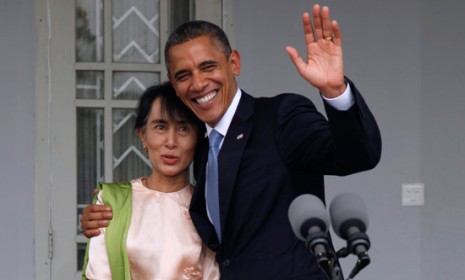Obama's historic Myanmar visit: Does it send the wrong message?
The president hails the Southeast Asian nation's "remarkable journey" toward democracy. Human rights activists argue that the journey has only just begun

A free daily email with the biggest news stories of the day – and the best features from TheWeek.com
You are now subscribed
Your newsletter sign-up was successful
On Monday, President Obama became the first sitting U.S. president to visit Myanmar, a long-time international pariah nation that recently began what Obama called a "remarkable journey" toward democracy after decades of authoritarian military rule. The president, who has eased sanctions and sent an ambassador to the country for the first time in 22 years, said he had traveled to Myanmar, also known as Burma, to "extend the hand of friendship," and vowed to support the Southeast Asian nation "every step of the way." Obama met with both President Thein Sein, a former junta member who has presided over reforms since taking office in March 2011, and opposition leader Aung San Suu Kyi, who spent 20 years under house arrest before her release two years ago. Obama used the occasion to push the country's leaders to strengthen the rule of law and extend political freedoms, but human rights activists criticized Obama for showing support for a government that still has hundreds of political prisoners locked up. Was Obama too quick to bestow legitimacy on Myanmar's new government?
Obama can do a lot of good in Myanmar: "Obama is well positioned to be an instrument for positive change," says the Bangkok Post in an editorial. Washington now has considerable influence in Myanmar, boasting positive relationships with both the government and opposition. Myanmar continues to make progress: Suu Kyi's victory in recent legislative elections "was a monumental step forward," as were the government's moves toward lifting censorship. Obama's high-profile gesture of goodwill gives Thein Sein strong incentive to keep the reforms coming.
The Week
Escape your echo chamber. Get the facts behind the news, plus analysis from multiple perspectives.

Sign up for The Week's Free Newsletters
From our morning news briefing to a weekly Good News Newsletter, get the best of The Week delivered directly to your inbox.
From our morning news briefing to a weekly Good News Newsletter, get the best of The Week delivered directly to your inbox.
This might be too much, too soon: Myanmar has undeniably come a long way since holding rigged elections in 2010, says Joshua Kurlantzick at Foreign Policy. But "Washington's love affair with Myanmar" is premature. "Myanmar's political and economic changes, though substantial, are not as secure as many Burmese reformers and outside observers think." Many parts of the country are still being ravaged by civil war, and Thein Sein, despite his reforms, "remains highly indebted to the army, which operates in the shadows behind him." America should be wary of cozying up too closely to Myanmar's government.
But more than the future of Burma is at stake: Obama is not merely trying to bolster democracy in Myanmar, says Michael Schuman at TIME. He's urging other countries in Southeast Asia, "one of the most important regions for world economic growth," to open up their political and economic systems, too. This is a critical part of Obama's "'pivot' to Asia" to counter China's booming influence in the region. This risky but "crucial overseas jaunt" was necessary, regardless of how it pans out in Burma.
"Forget the fiscal cliff: Why Obama is in Asia"
A free daily email with the biggest news stories of the day – and the best features from TheWeek.com